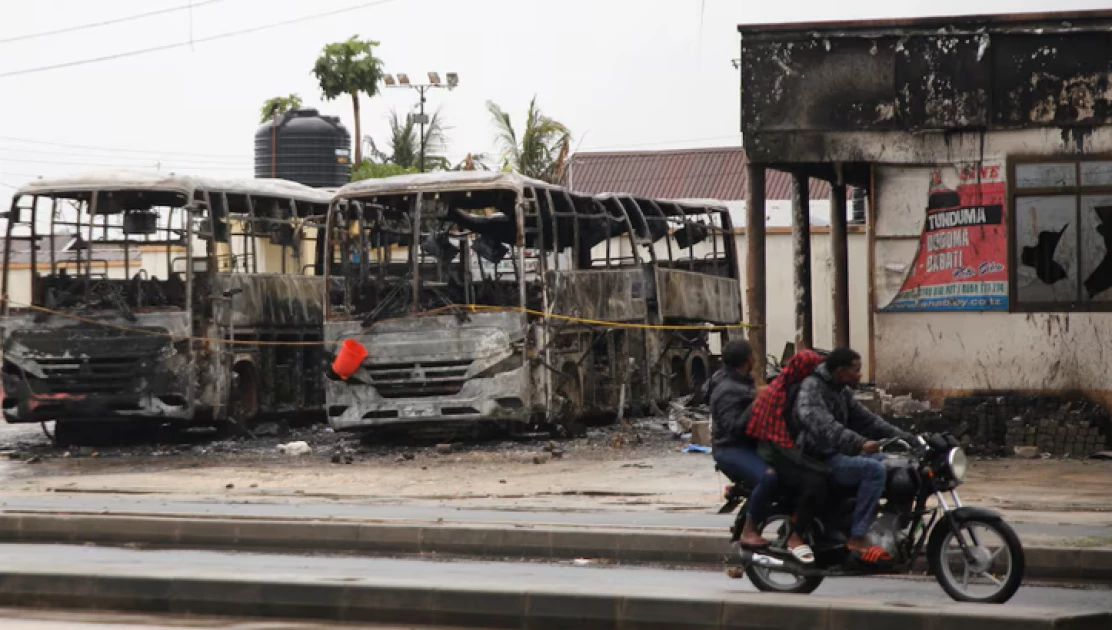Rights groups say 3,000 killed in Tanzania, demand resignation, prosecution of President Suluhu

People ride a motorcycle past the wreckage of buses burnt during protests, following a general election marred by violent demonstrations over the exclusion of two leading opposition candidates, at the Mwembechai area in Kinondoni district in Dar es Salaam, Tanzania, November 4, 2025. REUTERS/Emmanuel Herman

Audio By Vocalize
A coalition of African civil society organisations has
accused Tanzanian President Samia Suluhu Hassan of presiding over what it calls
a “state-engineered massacre,” alleging that more than 3,000 people have been
killed and thousands remain missing following violent crackdowns on protesters
and dissenters across the country.
In a strongly worded statement issued under the banner of the Jumuiya Ni Yetu movement and the Pan-African Solidarity Collective, the groups demanded that President Suluhu “step down immediately” and face prosecution for crimes against humanity.
“President Samia Suluhu must step down immediately. She lacks legitimacy, has lost the moral mandate to govern, and now presides over mass atrocities,” the statement reads.
“She must resign and be immediately prosecuted to the full extent of the law for her crimes against humanity.”
According to the organisations, security personnel have been “storming homes, dragging citizens out, and shooting them on their doorsteps for daring to protest the sham election of October 29 or simply for rejecting the tightening authoritarian rule under Samia Suluhu.”
“Witnesses report security personnel smashing down doors in nighttime raids, hunting men and boys over the age of 15. Some have been brutally beaten on their doorsteps and then dragged away by police, whereas others were murdered in their very own homes. The youngest, who was shot and murdered, was a one-year-old,” the statement claims.
“We have received information that mass graves are being dug
in major towns across Tanzania… Many bore head and chest gunshot wounds,
leaving no doubt these were targeted killings, not crowd-control actions."
The Jumuiya Ni Yetu movement also accused the
government of a deliberate campaign to erase evidence of the killings. It said that hospitals were placed under heavy security, with families of the dead and
missing being “harassed, intimidated, and arrested” for seeking information.
“Doctors and nurses were being given orders to ‘maliza’
(kill) those who were in critical care from gunshot wounds. We believe that at least 2,000 missing bodies reported by families are among those being buried
in these mass graves,” added the groups.
The coalition called on the African Union (AU), the Southern
African Development Community (SADC), and regional governments to urgently
intervene, initiate an independent international fact-finding mission, and
convene an emergency Peace and Security Council meeting to address the
escalating crisis.
“The African Union must immediately convene an emergency Peace and Security Council meeting… and invoke its mandate under Article 4 of its Constitutive Act,” the groups urged.
“SADC, particularly President Peter Mutharika, should immediately intervene… to
urge the Tanzanian Government to desist from further human rights violations,
particularly the ongoing crimes against humanity.”
The statement also accused President Suluhu’s administration
of criminalising dissent and feminist organising, targeting activists, journalists,
and minority communities.
“Under Suluhu, dissent has been criminalised. Women’s
organising has been surveilled. Gender-nonconforming people, activists,
journalists, and marginalised communities have been violently targeted,” read part of the statement.
The Jumuiya Ni Yetu coalition described Tanzania’s
current situation as a “humanitarian catastrophe”, warning that “the
dictators of the region are collaborating to spill more blood” and calling on
citizens of the continent “not to enable another blood-soaked crisis.”
The groups demanded an immediate political transition to an
interim government to oversee “long-delayed political reforms” and prepare for
credible elections under independent oversight.
“Tanzania is experiencing a humanitarian catastrophe, and
although the dictators of the region are collaborating to spill more blood, the
citizens of the region will not enable another blood-soaked crisis,” the
statement adds.


Leave a Comment